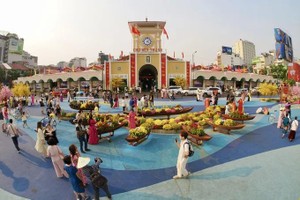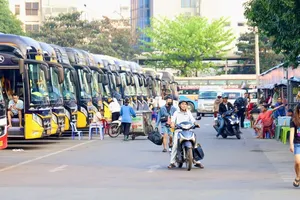 |
A social housing project in HCMC's Binh Tan District |
Mr. Huynh Thanh Khiet, Deputy Director of the Ho Chi Minh City Department of Construction, said that the current land law stipulates that land for implementing social housing projects is formed from land allocation, to lease land according to planning and 20 percent of the land area of commercial housing projects for social housing.
Regardless of the source, land for social housing construction must comply with the principle of conformity with planning. The Law on Housing since 2005 also stipulated that when approving urban planning, rural construction planning, construction of industrial parks, and research and training zones, the land area for housing construction must be clearly defined.
However, in many urban development planning projects of the city, there is no specific area and location for this type of land. Specifically, in the HCMC land use plan for the period 2011-2020, there is no specific target for land for the construction of social housing, but only general criteria for residential land. This leads to confusion and a lack of initiative in creating a land fund for social housing development in many districts; even making it difficult for businesses who want to invest in this housing segment.
He took the Le Thanh Tan Kien social housing project of Le Thanh Company as an example. This more than 23,000 square meter land area is originally agricultural land, the company has negotiated compensation with the owners of the land.
According to the subdivision planning, this is new construction housing land, so the investment of Le Thanh Company in housing construction is in accordance with the planning. However, due to the lack of regulations on whether this land is for the construction of social housing or not, Le Thanh Company must ask for confirmation of this content with the relevant authorities in order to enjoy incentives to increase the maximum land use coefficient up to 1.5 times.
Plus, reserving 20 percent of the land fund in commercial housing projects for social housing construction is also facing many problems. After the Law on Housing 2005, the Law on Housing 2014 and subsequent guiding documents affirm that this land fund is required, especially adding the form of payment of social housing obligations.
However, no social housing projects have recently been implemented from this land source. The performance of obligations in cash including the stage of determining the payable value to the management and exploitation of the amount is still confusing.
Thereby, the Department of Construction of Ho Chi Minh City recently proposed to rearrange the land fund directly managed by the State or the land fund compensated by the State and then adjust the planning to land for construction of social housing as well as organize bidding to select investors to build social houses in the form of the lease with enterprise capital with a maximum lease period of 50 years.
Last but not least, the department also proposed to review and adjust the planning of the large-scale land fund, farmland that has been assigned to investors in suburban districts in addition to bidding to select investors for social housing projects.
Regarding investment procedures for commercial housing projects with the land fund for social housing construction, the Department of Construction proposed continued reform of administrative procedures by shortening the time to carry out investment procedures to build projects.
The 2003 Land Law stipulates that each provincial-level locality must have a land fund development organization to help provincial people's committees implement the State mechanism to recover land according to the planning as well as according to the project. Land fund development organizations may operate under the enterprise mechanism in the form of state-owned enterprises or revenue-generating non-business units.
According to Director of the Ho Chi Minh City Department of Natural Resources and Environment Nguyen Toan Thang, the land fund development organization should operate according to the mechanism of the enterprise so that it can both be more active in dealing with land users and be more proactive in mobilizing capital in many forms.
The land fund development organization may study the district-level annual land use planning and plans to determine the areas of land that will be acquired and collect opinions from people in the acquired land area in order to come up with a solution to suit the land transfer project based on the community’s consensus.
To achieve the goal of developing social housing, the creation of a land fund plays a decisive role. Therefore, related agencies should remove the major mechanism bottlenecks in land fund creation soon.
In addition, the city failed to effectively exploit the redundant land fund from the rearrangement and handling of public assets for the development of social housing which is also a reason for the limited housing supply in the city.
























